Health Promotion Strategies for Bowel Cancer in Australia
VerifiedAdded on 2023/04/04
|9
|2421
|457
AI Summary
This document discusses the health promotion strategies used by Bowel Cancer Australia to address bowel cancer in Australia. It explores the key features of the program, how it demonstrates the principles of primary healthcare, and how the principles of health promotion are applied in their strategies. Additionally, it provides a recommendation for improving the program to better meet the needs of the target group.
Contribute Materials
Your contribution can guide someone’s learning journey. Share your
documents today.
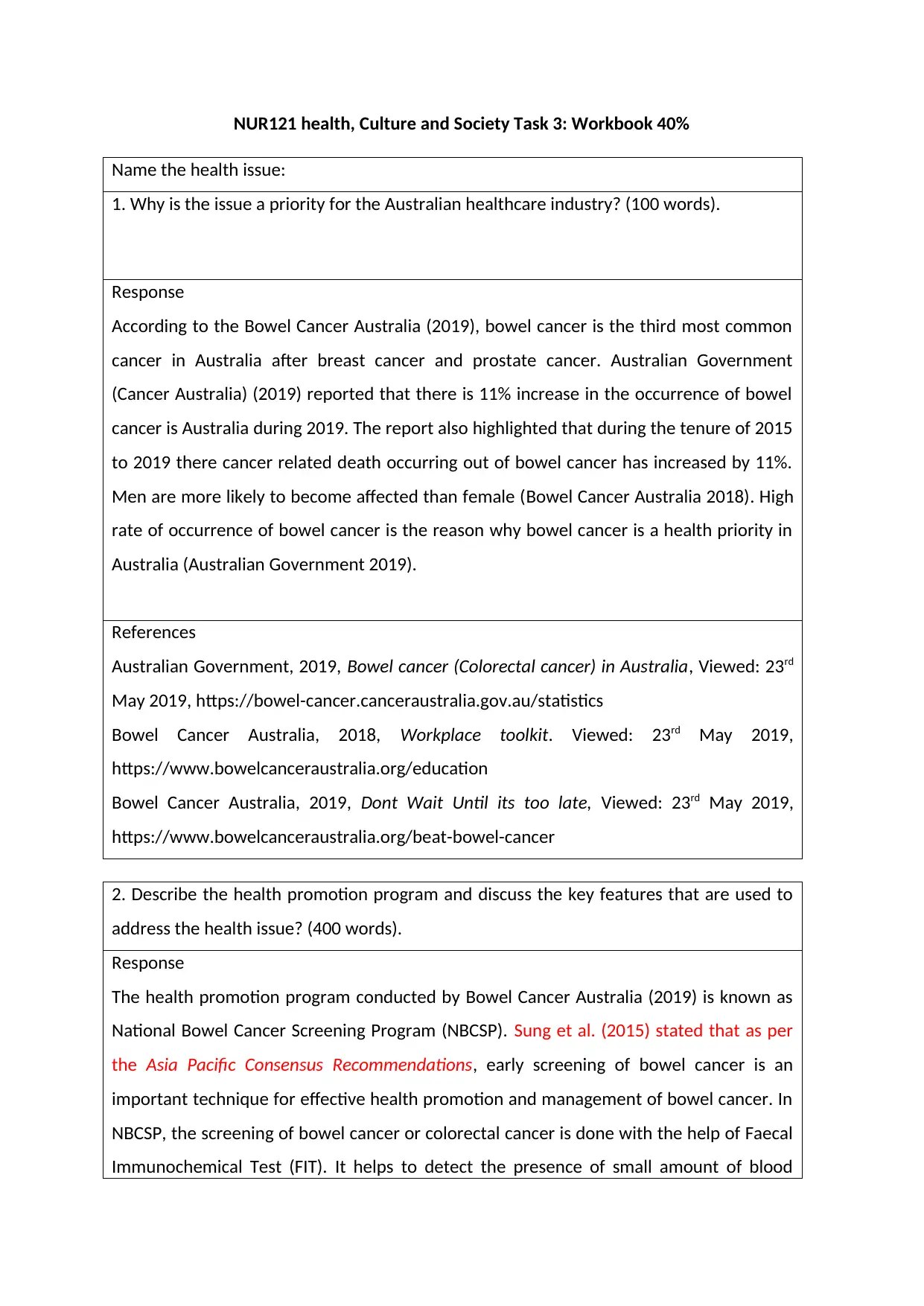
NUR121 health, Culture and Society Task 3: Workbook 40%
Name the health issue:
1. Why is the issue a priority for the Australian healthcare industry? (100 words).
Response
According to the Bowel Cancer Australia (2019), bowel cancer is the third most common
cancer in Australia after breast cancer and prostate cancer. Australian Government
(Cancer Australia) (2019) reported that there is 11% increase in the occurrence of bowel
cancer is Australia during 2019. The report also highlighted that during the tenure of 2015
to 2019 there cancer related death occurring out of bowel cancer has increased by 11%.
Men are more likely to become affected than female (Bowel Cancer Australia 2018). High
rate of occurrence of bowel cancer is the reason why bowel cancer is a health priority in
Australia (Australian Government 2019).
References
Australian Government, 2019, Bowel cancer (Colorectal cancer) in Australia, Viewed: 23rd
May 2019, https://bowel-cancer.canceraustralia.gov.au/statistics
Bowel Cancer Australia, 2018, Workplace toolkit. Viewed: 23rd May 2019,
https://www.bowelcanceraustralia.org/education
Bowel Cancer Australia, 2019, Dont Wait Until its too late, Viewed: 23rd May 2019,
https://www.bowelcanceraustralia.org/beat-bowel-cancer
2. Describe the health promotion program and discuss the key features that are used to
address the health issue? (400 words).
Response
The health promotion program conducted by Bowel Cancer Australia (2019) is known as
National Bowel Cancer Screening Program (NBCSP). Sung et al. (2015) stated that as per
the Asia Pacific Consensus Recommendations, early screening of bowel cancer is an
important technique for effective health promotion and management of bowel cancer. In
NBCSP, the screening of bowel cancer or colorectal cancer is done with the help of Faecal
Immunochemical Test (FIT). It helps to detect the presence of small amount of blood
Name the health issue:
1. Why is the issue a priority for the Australian healthcare industry? (100 words).
Response
According to the Bowel Cancer Australia (2019), bowel cancer is the third most common
cancer in Australia after breast cancer and prostate cancer. Australian Government
(Cancer Australia) (2019) reported that there is 11% increase in the occurrence of bowel
cancer is Australia during 2019. The report also highlighted that during the tenure of 2015
to 2019 there cancer related death occurring out of bowel cancer has increased by 11%.
Men are more likely to become affected than female (Bowel Cancer Australia 2018). High
rate of occurrence of bowel cancer is the reason why bowel cancer is a health priority in
Australia (Australian Government 2019).
References
Australian Government, 2019, Bowel cancer (Colorectal cancer) in Australia, Viewed: 23rd
May 2019, https://bowel-cancer.canceraustralia.gov.au/statistics
Bowel Cancer Australia, 2018, Workplace toolkit. Viewed: 23rd May 2019,
https://www.bowelcanceraustralia.org/education
Bowel Cancer Australia, 2019, Dont Wait Until its too late, Viewed: 23rd May 2019,
https://www.bowelcanceraustralia.org/beat-bowel-cancer
2. Describe the health promotion program and discuss the key features that are used to
address the health issue? (400 words).
Response
The health promotion program conducted by Bowel Cancer Australia (2019) is known as
National Bowel Cancer Screening Program (NBCSP). Sung et al. (2015) stated that as per
the Asia Pacific Consensus Recommendations, early screening of bowel cancer is an
important technique for effective health promotion and management of bowel cancer. In
NBCSP, the screening of bowel cancer or colorectal cancer is done with the help of Faecal
Immunochemical Test (FIT). It helps to detect the presence of small amount of blood
Secure Best Marks with AI Grader
Need help grading? Try our AI Grader for instant feedback on your assignments.
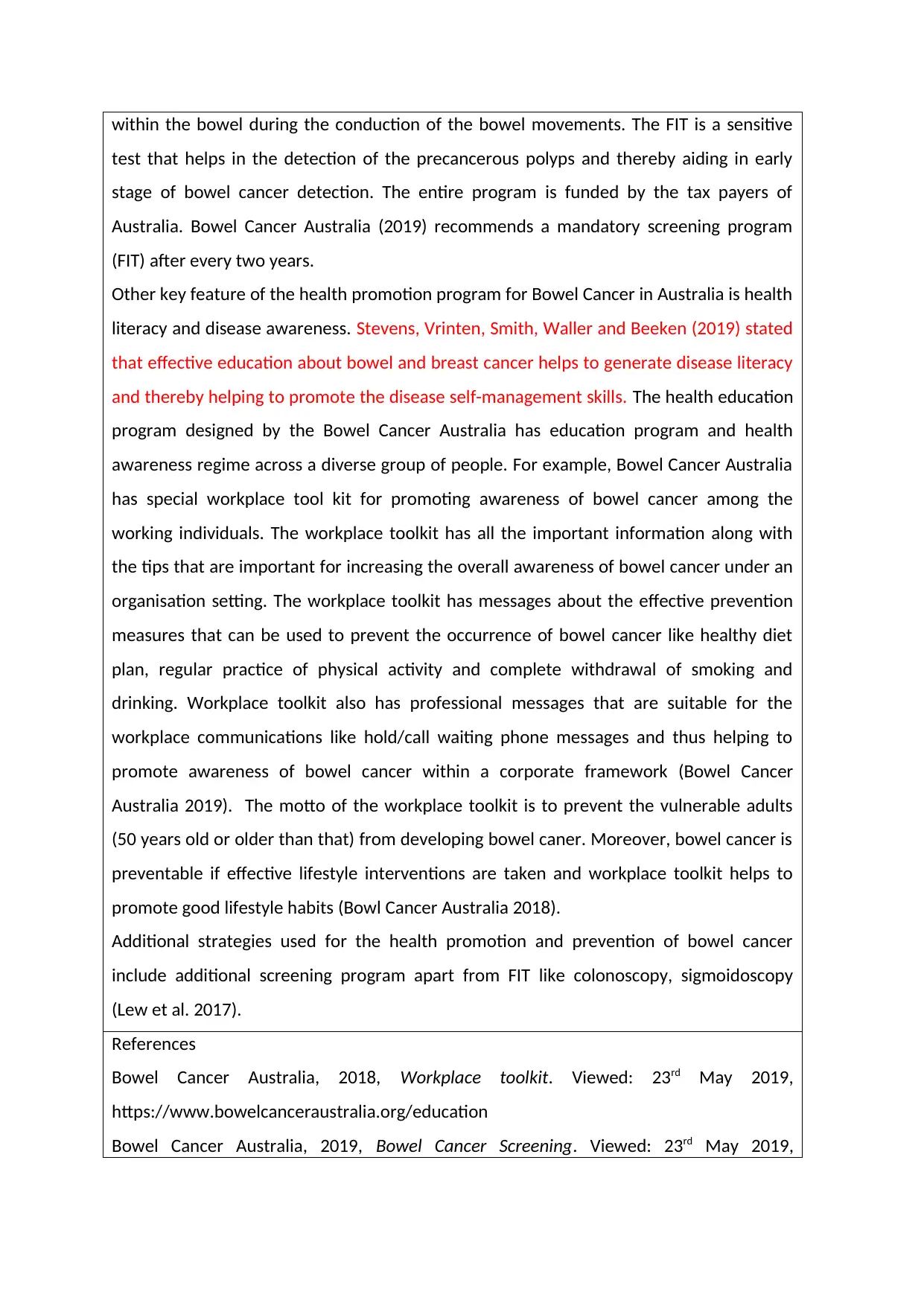
within the bowel during the conduction of the bowel movements. The FIT is a sensitive
test that helps in the detection of the precancerous polyps and thereby aiding in early
stage of bowel cancer detection. The entire program is funded by the tax payers of
Australia. Bowel Cancer Australia (2019) recommends a mandatory screening program
(FIT) after every two years.
Other key feature of the health promotion program for Bowel Cancer in Australia is health
literacy and disease awareness. Stevens, Vrinten, Smith, Waller and Beeken (2019) stated
that effective education about bowel and breast cancer helps to generate disease literacy
and thereby helping to promote the disease self-management skills. The health education
program designed by the Bowel Cancer Australia has education program and health
awareness regime across a diverse group of people. For example, Bowel Cancer Australia
has special workplace tool kit for promoting awareness of bowel cancer among the
working individuals. The workplace toolkit has all the important information along with
the tips that are important for increasing the overall awareness of bowel cancer under an
organisation setting. The workplace toolkit has messages about the effective prevention
measures that can be used to prevent the occurrence of bowel cancer like healthy diet
plan, regular practice of physical activity and complete withdrawal of smoking and
drinking. Workplace toolkit also has professional messages that are suitable for the
workplace communications like hold/call waiting phone messages and thus helping to
promote awareness of bowel cancer within a corporate framework (Bowel Cancer
Australia 2019). The motto of the workplace toolkit is to prevent the vulnerable adults
(50 years old or older than that) from developing bowel caner. Moreover, bowel cancer is
preventable if effective lifestyle interventions are taken and workplace toolkit helps to
promote good lifestyle habits (Bowl Cancer Australia 2018).
Additional strategies used for the health promotion and prevention of bowel cancer
include additional screening program apart from FIT like colonoscopy, sigmoidoscopy
(Lew et al. 2017).
References
Bowel Cancer Australia, 2018, Workplace toolkit. Viewed: 23rd May 2019,
https://www.bowelcanceraustralia.org/education
Bowel Cancer Australia, 2019, Bowel Cancer Screening. Viewed: 23rd May 2019,
test that helps in the detection of the precancerous polyps and thereby aiding in early
stage of bowel cancer detection. The entire program is funded by the tax payers of
Australia. Bowel Cancer Australia (2019) recommends a mandatory screening program
(FIT) after every two years.
Other key feature of the health promotion program for Bowel Cancer in Australia is health
literacy and disease awareness. Stevens, Vrinten, Smith, Waller and Beeken (2019) stated
that effective education about bowel and breast cancer helps to generate disease literacy
and thereby helping to promote the disease self-management skills. The health education
program designed by the Bowel Cancer Australia has education program and health
awareness regime across a diverse group of people. For example, Bowel Cancer Australia
has special workplace tool kit for promoting awareness of bowel cancer among the
working individuals. The workplace toolkit has all the important information along with
the tips that are important for increasing the overall awareness of bowel cancer under an
organisation setting. The workplace toolkit has messages about the effective prevention
measures that can be used to prevent the occurrence of bowel cancer like healthy diet
plan, regular practice of physical activity and complete withdrawal of smoking and
drinking. Workplace toolkit also has professional messages that are suitable for the
workplace communications like hold/call waiting phone messages and thus helping to
promote awareness of bowel cancer within a corporate framework (Bowel Cancer
Australia 2019). The motto of the workplace toolkit is to prevent the vulnerable adults
(50 years old or older than that) from developing bowel caner. Moreover, bowel cancer is
preventable if effective lifestyle interventions are taken and workplace toolkit helps to
promote good lifestyle habits (Bowl Cancer Australia 2018).
Additional strategies used for the health promotion and prevention of bowel cancer
include additional screening program apart from FIT like colonoscopy, sigmoidoscopy
(Lew et al. 2017).
References
Bowel Cancer Australia, 2018, Workplace toolkit. Viewed: 23rd May 2019,
https://www.bowelcanceraustralia.org/education
Bowel Cancer Australia, 2019, Bowel Cancer Screening. Viewed: 23rd May 2019,
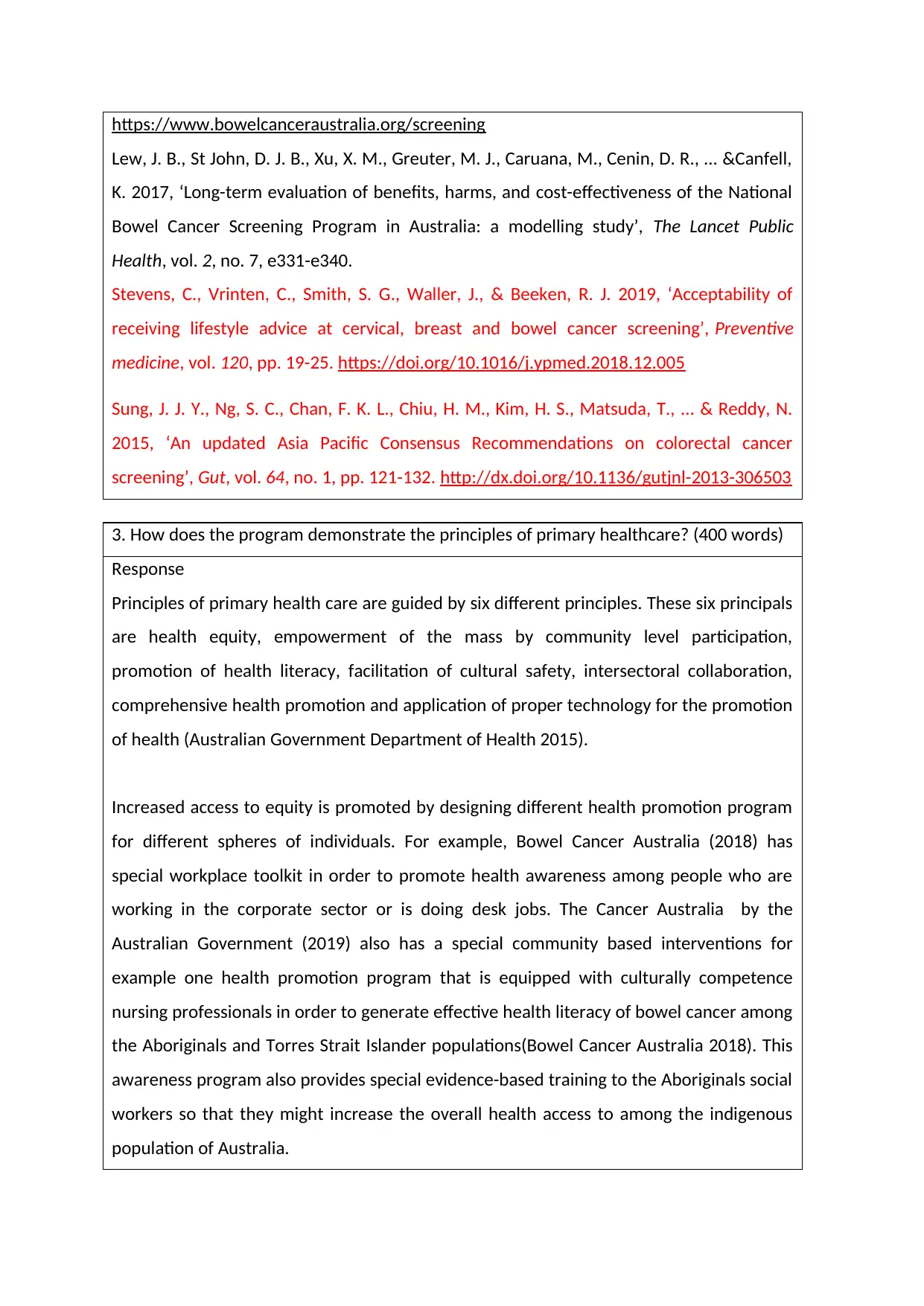
https://www.bowelcanceraustralia.org/screening
Lew, J. B., St John, D. J. B., Xu, X. M., Greuter, M. J., Caruana, M., Cenin, D. R., ... &Canfell,
K. 2017, ‘Long-term evaluation of benefits, harms, and cost-effectiveness of the National
Bowel Cancer Screening Program in Australia: a modelling study’, The Lancet Public
Health, vol. 2, no. 7, e331-e340.
Stevens, C., Vrinten, C., Smith, S. G., Waller, J., & Beeken, R. J. 2019, ‘Acceptability of
receiving lifestyle advice at cervical, breast and bowel cancer screening’, Preventive
medicine, vol. 120, pp. 19-25. https://doi.org/10.1016/j.ypmed.2018.12.005
Sung, J. J. Y., Ng, S. C., Chan, F. K. L., Chiu, H. M., Kim, H. S., Matsuda, T., ... & Reddy, N.
2015, ‘An updated Asia Pacific Consensus Recommendations on colorectal cancer
screening’, Gut, vol. 64, no. 1, pp. 121-132. http://dx.doi.org/10.1136/gutjnl-2013-306503
3. How does the program demonstrate the principles of primary healthcare? (400 words)
Response
Principles of primary health care are guided by six different principles. These six principals
are health equity, empowerment of the mass by community level participation,
promotion of health literacy, facilitation of cultural safety, intersectoral collaboration,
comprehensive health promotion and application of proper technology for the promotion
of health (Australian Government Department of Health 2015).
Increased access to equity is promoted by designing different health promotion program
for different spheres of individuals. For example, Bowel Cancer Australia (2018) has
special workplace toolkit in order to promote health awareness among people who are
working in the corporate sector or is doing desk jobs. The Cancer Australia by the
Australian Government (2019) also has a special community based interventions for
example one health promotion program that is equipped with culturally competence
nursing professionals in order to generate effective health literacy of bowel cancer among
the Aboriginals and Torres Strait Islander populations(Bowel Cancer Australia 2018). This
awareness program also provides special evidence-based training to the Aboriginals social
workers so that they might increase the overall health access to among the indigenous
population of Australia.
Lew, J. B., St John, D. J. B., Xu, X. M., Greuter, M. J., Caruana, M., Cenin, D. R., ... &Canfell,
K. 2017, ‘Long-term evaluation of benefits, harms, and cost-effectiveness of the National
Bowel Cancer Screening Program in Australia: a modelling study’, The Lancet Public
Health, vol. 2, no. 7, e331-e340.
Stevens, C., Vrinten, C., Smith, S. G., Waller, J., & Beeken, R. J. 2019, ‘Acceptability of
receiving lifestyle advice at cervical, breast and bowel cancer screening’, Preventive
medicine, vol. 120, pp. 19-25. https://doi.org/10.1016/j.ypmed.2018.12.005
Sung, J. J. Y., Ng, S. C., Chan, F. K. L., Chiu, H. M., Kim, H. S., Matsuda, T., ... & Reddy, N.
2015, ‘An updated Asia Pacific Consensus Recommendations on colorectal cancer
screening’, Gut, vol. 64, no. 1, pp. 121-132. http://dx.doi.org/10.1136/gutjnl-2013-306503
3. How does the program demonstrate the principles of primary healthcare? (400 words)
Response
Principles of primary health care are guided by six different principles. These six principals
are health equity, empowerment of the mass by community level participation,
promotion of health literacy, facilitation of cultural safety, intersectoral collaboration,
comprehensive health promotion and application of proper technology for the promotion
of health (Australian Government Department of Health 2015).
Increased access to equity is promoted by designing different health promotion program
for different spheres of individuals. For example, Bowel Cancer Australia (2018) has
special workplace toolkit in order to promote health awareness among people who are
working in the corporate sector or is doing desk jobs. The Cancer Australia by the
Australian Government (2019) also has a special community based interventions for
example one health promotion program that is equipped with culturally competence
nursing professionals in order to generate effective health literacy of bowel cancer among
the Aboriginals and Torres Strait Islander populations(Bowel Cancer Australia 2018). This
awareness program also provides special evidence-based training to the Aboriginals social
workers so that they might increase the overall health access to among the indigenous
population of Australia.
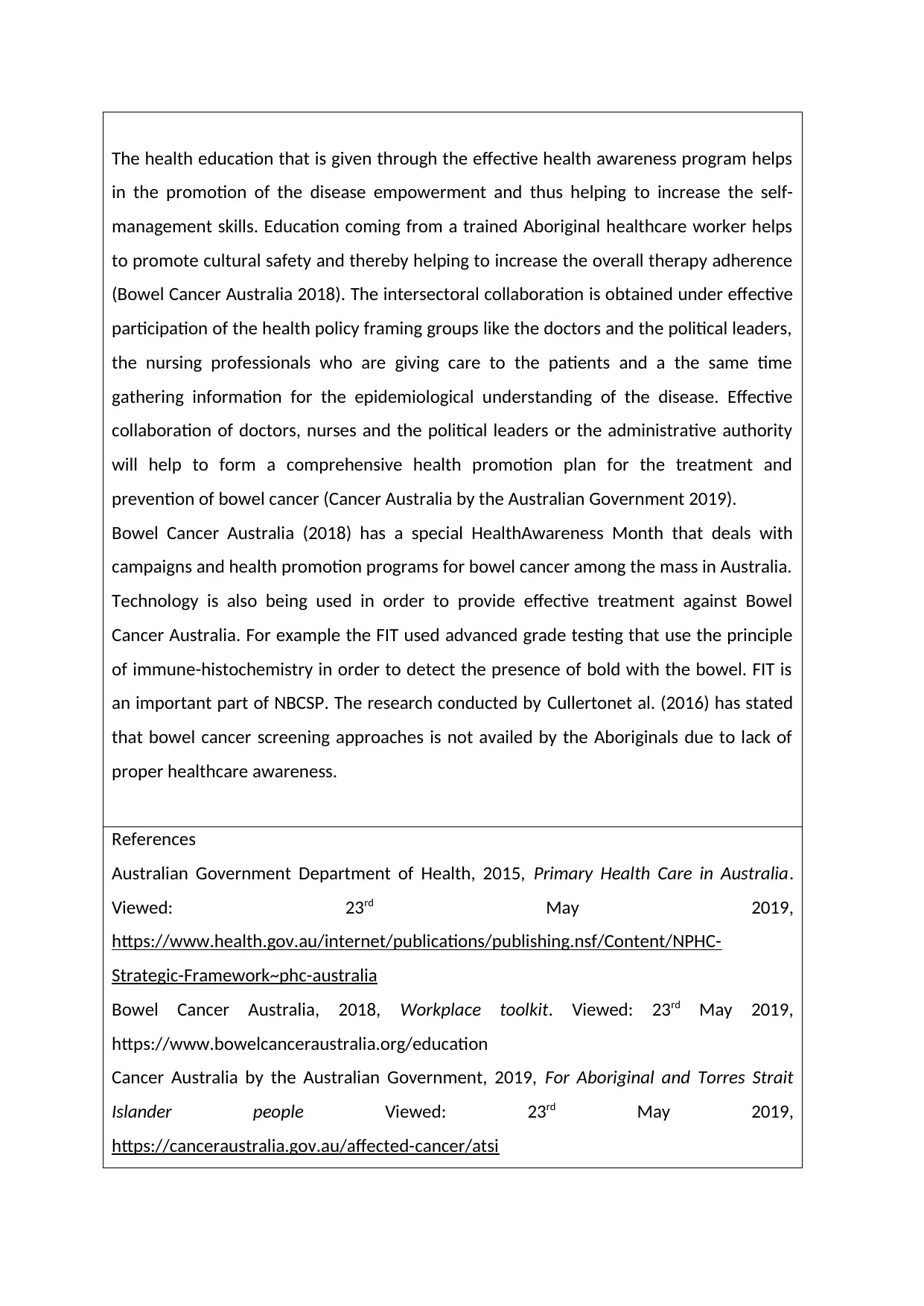
The health education that is given through the effective health awareness program helps
in the promotion of the disease empowerment and thus helping to increase the self-
management skills. Education coming from a trained Aboriginal healthcare worker helps
to promote cultural safety and thereby helping to increase the overall therapy adherence
(Bowel Cancer Australia 2018). The intersectoral collaboration is obtained under effective
participation of the health policy framing groups like the doctors and the political leaders,
the nursing professionals who are giving care to the patients and a the same time
gathering information for the epidemiological understanding of the disease. Effective
collaboration of doctors, nurses and the political leaders or the administrative authority
will help to form a comprehensive health promotion plan for the treatment and
prevention of bowel cancer (Cancer Australia by the Australian Government 2019).
Bowel Cancer Australia (2018) has a special HealthAwareness Month that deals with
campaigns and health promotion programs for bowel cancer among the mass in Australia.
Technology is also being used in order to provide effective treatment against Bowel
Cancer Australia. For example the FIT used advanced grade testing that use the principle
of immune-histochemistry in order to detect the presence of bold with the bowel. FIT is
an important part of NBCSP. The research conducted by Cullertonet al. (2016) has stated
that bowel cancer screening approaches is not availed by the Aboriginals due to lack of
proper healthcare awareness.
References
Australian Government Department of Health, 2015, Primary Health Care in Australia.
Viewed: 23rd May 2019,
https://www.health.gov.au/internet/publications/publishing.nsf/Content/NPHC-
Strategic-Framework~phc-australia
Bowel Cancer Australia, 2018, Workplace toolkit. Viewed: 23rd May 2019,
https://www.bowelcanceraustralia.org/education
Cancer Australia by the Australian Government, 2019, For Aboriginal and Torres Strait
Islander people Viewed: 23rd May 2019,
https://canceraustralia.gov.au/affected-cancer/atsi
in the promotion of the disease empowerment and thus helping to increase the self-
management skills. Education coming from a trained Aboriginal healthcare worker helps
to promote cultural safety and thereby helping to increase the overall therapy adherence
(Bowel Cancer Australia 2018). The intersectoral collaboration is obtained under effective
participation of the health policy framing groups like the doctors and the political leaders,
the nursing professionals who are giving care to the patients and a the same time
gathering information for the epidemiological understanding of the disease. Effective
collaboration of doctors, nurses and the political leaders or the administrative authority
will help to form a comprehensive health promotion plan for the treatment and
prevention of bowel cancer (Cancer Australia by the Australian Government 2019).
Bowel Cancer Australia (2018) has a special HealthAwareness Month that deals with
campaigns and health promotion programs for bowel cancer among the mass in Australia.
Technology is also being used in order to provide effective treatment against Bowel
Cancer Australia. For example the FIT used advanced grade testing that use the principle
of immune-histochemistry in order to detect the presence of bold with the bowel. FIT is
an important part of NBCSP. The research conducted by Cullertonet al. (2016) has stated
that bowel cancer screening approaches is not availed by the Aboriginals due to lack of
proper healthcare awareness.
References
Australian Government Department of Health, 2015, Primary Health Care in Australia.
Viewed: 23rd May 2019,
https://www.health.gov.au/internet/publications/publishing.nsf/Content/NPHC-
Strategic-Framework~phc-australia
Bowel Cancer Australia, 2018, Workplace toolkit. Viewed: 23rd May 2019,
https://www.bowelcanceraustralia.org/education
Cancer Australia by the Australian Government, 2019, For Aboriginal and Torres Strait
Islander people Viewed: 23rd May 2019,
https://canceraustralia.gov.au/affected-cancer/atsi
Secure Best Marks with AI Grader
Need help grading? Try our AI Grader for instant feedback on your assignments.
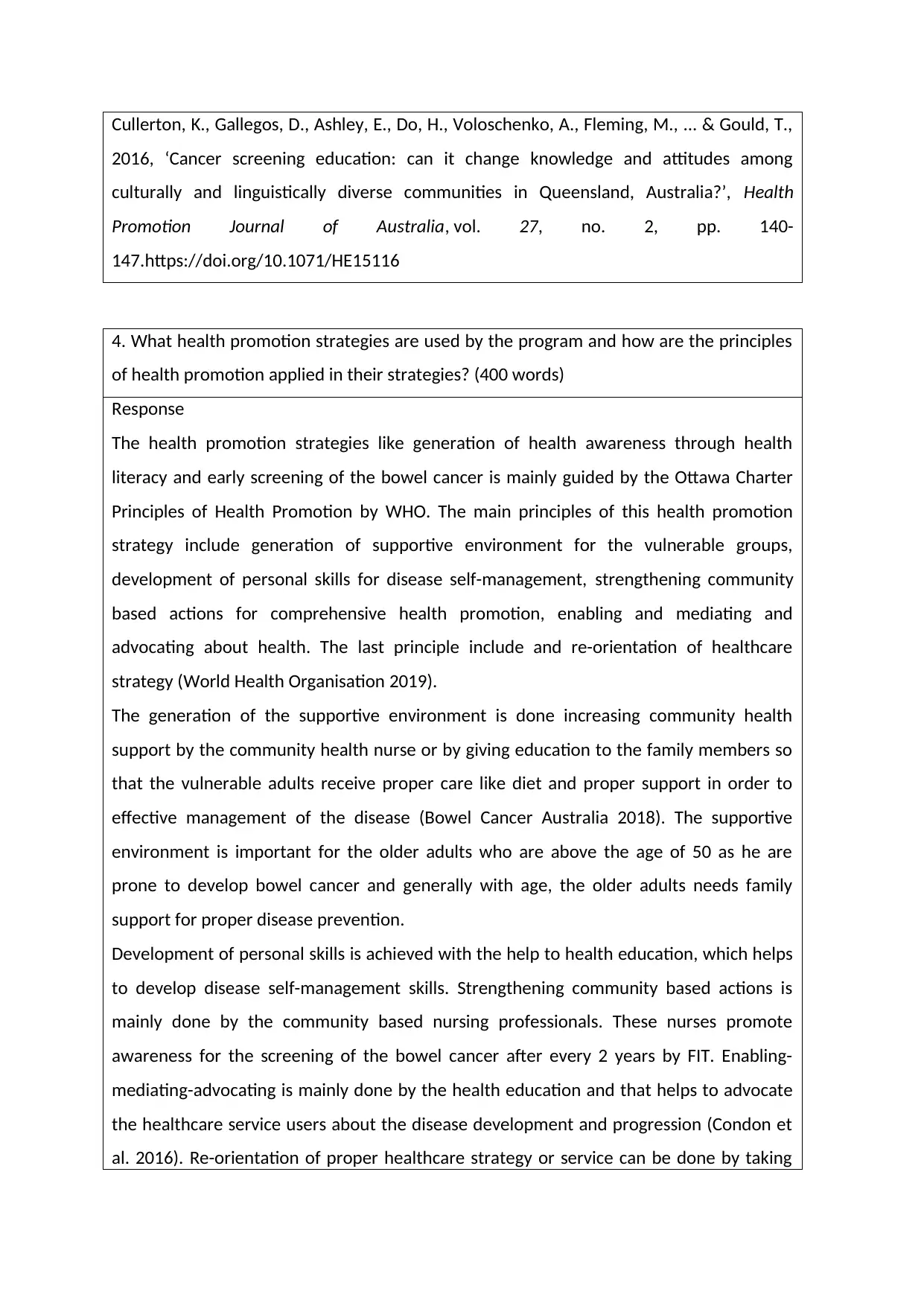
Cullerton, K., Gallegos, D., Ashley, E., Do, H., Voloschenko, A., Fleming, M., ... & Gould, T.,
2016, ‘Cancer screening education: can it change knowledge and attitudes among
culturally and linguistically diverse communities in Queensland, Australia?’, Health
Promotion Journal of Australia, vol. 27, no. 2, pp. 140-
147.https://doi.org/10.1071/HE15116
4. What health promotion strategies are used by the program and how are the principles
of health promotion applied in their strategies? (400 words)
Response
The health promotion strategies like generation of health awareness through health
literacy and early screening of the bowel cancer is mainly guided by the Ottawa Charter
Principles of Health Promotion by WHO. The main principles of this health promotion
strategy include generation of supportive environment for the vulnerable groups,
development of personal skills for disease self-management, strengthening community
based actions for comprehensive health promotion, enabling and mediating and
advocating about health. The last principle include and re-orientation of healthcare
strategy (World Health Organisation 2019).
The generation of the supportive environment is done increasing community health
support by the community health nurse or by giving education to the family members so
that the vulnerable adults receive proper care like diet and proper support in order to
effective management of the disease (Bowel Cancer Australia 2018). The supportive
environment is important for the older adults who are above the age of 50 as he are
prone to develop bowel cancer and generally with age, the older adults needs family
support for proper disease prevention.
Development of personal skills is achieved with the help to health education, which helps
to develop disease self-management skills. Strengthening community based actions is
mainly done by the community based nursing professionals. These nurses promote
awareness for the screening of the bowel cancer after every 2 years by FIT. Enabling-
mediating-advocating is mainly done by the health education and that helps to advocate
the healthcare service users about the disease development and progression (Condon et
al. 2016). Re-orientation of proper healthcare strategy or service can be done by taking
2016, ‘Cancer screening education: can it change knowledge and attitudes among
culturally and linguistically diverse communities in Queensland, Australia?’, Health
Promotion Journal of Australia, vol. 27, no. 2, pp. 140-
147.https://doi.org/10.1071/HE15116
4. What health promotion strategies are used by the program and how are the principles
of health promotion applied in their strategies? (400 words)
Response
The health promotion strategies like generation of health awareness through health
literacy and early screening of the bowel cancer is mainly guided by the Ottawa Charter
Principles of Health Promotion by WHO. The main principles of this health promotion
strategy include generation of supportive environment for the vulnerable groups,
development of personal skills for disease self-management, strengthening community
based actions for comprehensive health promotion, enabling and mediating and
advocating about health. The last principle include and re-orientation of healthcare
strategy (World Health Organisation 2019).
The generation of the supportive environment is done increasing community health
support by the community health nurse or by giving education to the family members so
that the vulnerable adults receive proper care like diet and proper support in order to
effective management of the disease (Bowel Cancer Australia 2018). The supportive
environment is important for the older adults who are above the age of 50 as he are
prone to develop bowel cancer and generally with age, the older adults needs family
support for proper disease prevention.
Development of personal skills is achieved with the help to health education, which helps
to develop disease self-management skills. Strengthening community based actions is
mainly done by the community based nursing professionals. These nurses promote
awareness for the screening of the bowel cancer after every 2 years by FIT. Enabling-
mediating-advocating is mainly done by the health education and that helps to advocate
the healthcare service users about the disease development and progression (Condon et
al. 2016). Re-orientation of proper healthcare strategy or service can be done by taking
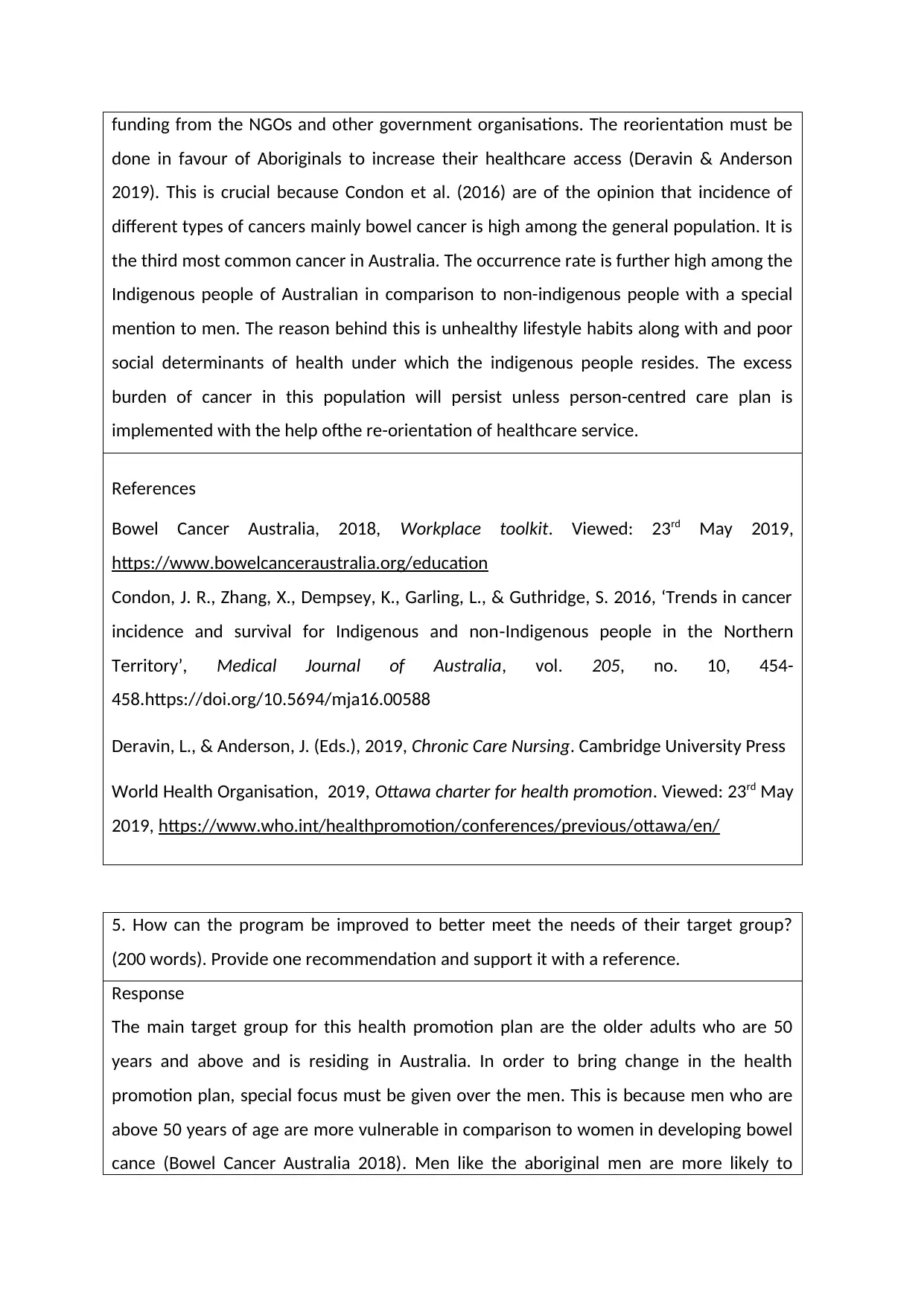
funding from the NGOs and other government organisations. The reorientation must be
done in favour of Aboriginals to increase their healthcare access (Deravin & Anderson
2019). This is crucial because Condon et al. (2016) are of the opinion that incidence of
different types of cancers mainly bowel cancer is high among the general population. It is
the third most common cancer in Australia. The occurrence rate is further high among the
Indigenous people of Australian in comparison to non-indigenous people with a special
mention to men. The reason behind this is unhealthy lifestyle habits along with and poor
social determinants of health under which the indigenous people resides. The excess
burden of cancer in this population will persist unless person-centred care plan is
implemented with the help ofthe re-orientation of healthcare service.
References
Bowel Cancer Australia, 2018, Workplace toolkit. Viewed: 23rd May 2019,
https://www.bowelcanceraustralia.org/education
Condon, J. R., Zhang, X., Dempsey, K., Garling, L., & Guthridge, S. 2016, ‘Trends in cancer
incidence and survival for Indigenous and non‐Indigenous people in the Northern
Territory’, Medical Journal of Australia, vol. 205, no. 10, 454-
458.https://doi.org/10.5694/mja16.00588
Deravin, L., & Anderson, J. (Eds.), 2019, Chronic Care Nursing. Cambridge University Press
World Health Organisation, 2019, Ottawa charter for health promotion. Viewed: 23rd May
2019, https://www.who.int/healthpromotion/conferences/previous/ottawa/en/
5. How can the program be improved to better meet the needs of their target group?
(200 words). Provide one recommendation and support it with a reference.
Response
The main target group for this health promotion plan are the older adults who are 50
years and above and is residing in Australia. In order to bring change in the health
promotion plan, special focus must be given over the men. This is because men who are
above 50 years of age are more vulnerable in comparison to women in developing bowel
cance (Bowel Cancer Australia 2018). Men like the aboriginal men are more likely to
done in favour of Aboriginals to increase their healthcare access (Deravin & Anderson
2019). This is crucial because Condon et al. (2016) are of the opinion that incidence of
different types of cancers mainly bowel cancer is high among the general population. It is
the third most common cancer in Australia. The occurrence rate is further high among the
Indigenous people of Australian in comparison to non-indigenous people with a special
mention to men. The reason behind this is unhealthy lifestyle habits along with and poor
social determinants of health under which the indigenous people resides. The excess
burden of cancer in this population will persist unless person-centred care plan is
implemented with the help ofthe re-orientation of healthcare service.
References
Bowel Cancer Australia, 2018, Workplace toolkit. Viewed: 23rd May 2019,
https://www.bowelcanceraustralia.org/education
Condon, J. R., Zhang, X., Dempsey, K., Garling, L., & Guthridge, S. 2016, ‘Trends in cancer
incidence and survival for Indigenous and non‐Indigenous people in the Northern
Territory’, Medical Journal of Australia, vol. 205, no. 10, 454-
458.https://doi.org/10.5694/mja16.00588
Deravin, L., & Anderson, J. (Eds.), 2019, Chronic Care Nursing. Cambridge University Press
World Health Organisation, 2019, Ottawa charter for health promotion. Viewed: 23rd May
2019, https://www.who.int/healthpromotion/conferences/previous/ottawa/en/
5. How can the program be improved to better meet the needs of their target group?
(200 words). Provide one recommendation and support it with a reference.
Response
The main target group for this health promotion plan are the older adults who are 50
years and above and is residing in Australia. In order to bring change in the health
promotion plan, special focus must be given over the men. This is because men who are
above 50 years of age are more vulnerable in comparison to women in developing bowel
cance (Bowel Cancer Australia 2018). Men like the aboriginal men are more likely to
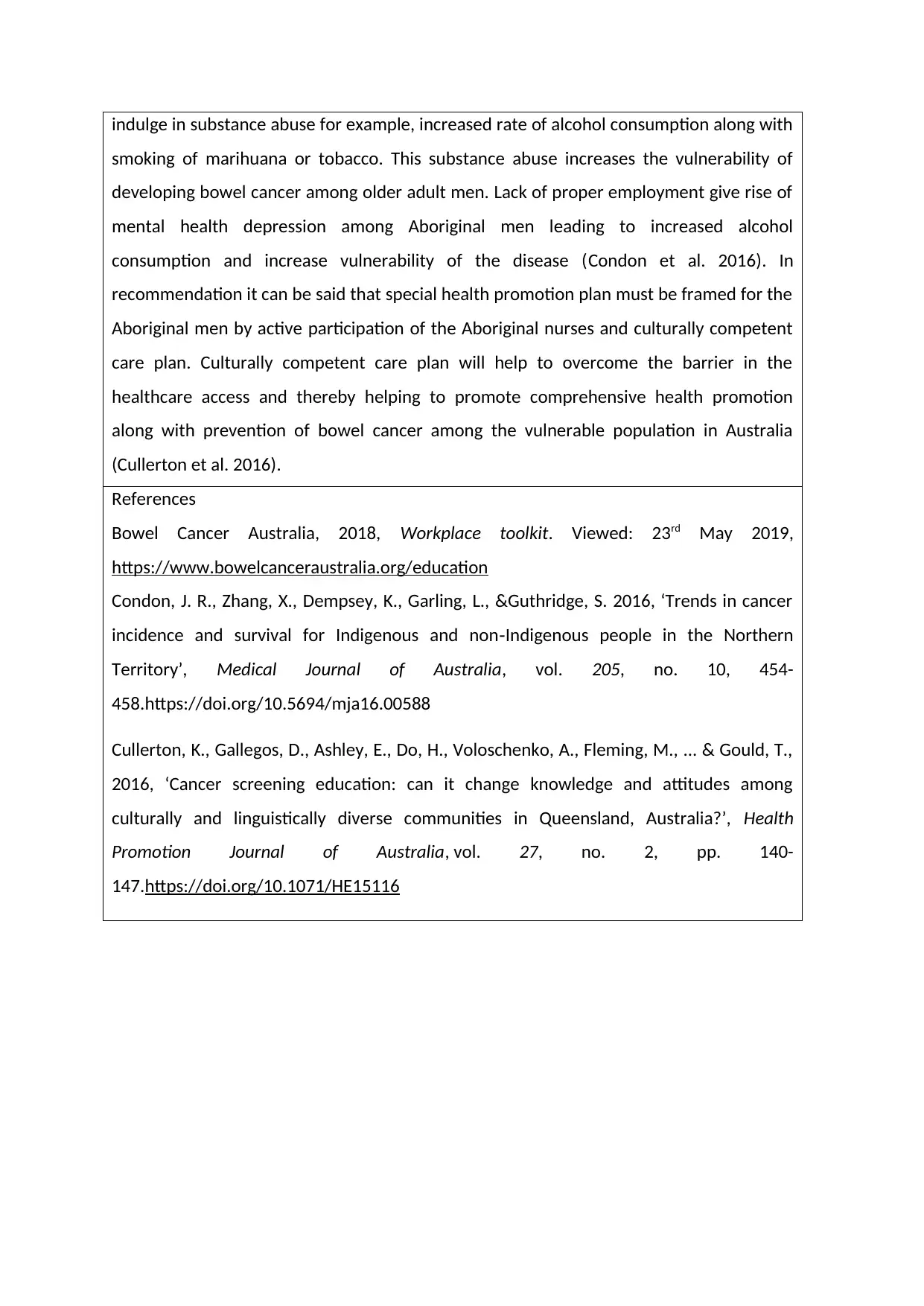
indulge in substance abuse for example, increased rate of alcohol consumption along with
smoking of marihuana or tobacco. This substance abuse increases the vulnerability of
developing bowel cancer among older adult men. Lack of proper employment give rise of
mental health depression among Aboriginal men leading to increased alcohol
consumption and increase vulnerability of the disease (Condon et al. 2016). In
recommendation it can be said that special health promotion plan must be framed for the
Aboriginal men by active participation of the Aboriginal nurses and culturally competent
care plan. Culturally competent care plan will help to overcome the barrier in the
healthcare access and thereby helping to promote comprehensive health promotion
along with prevention of bowel cancer among the vulnerable population in Australia
(Cullerton et al. 2016).
References
Bowel Cancer Australia, 2018, Workplace toolkit. Viewed: 23rd May 2019,
https://www.bowelcanceraustralia.org/education
Condon, J. R., Zhang, X., Dempsey, K., Garling, L., &Guthridge, S. 2016, ‘Trends in cancer
incidence and survival for Indigenous and non‐Indigenous people in the Northern
Territory’, Medical Journal of Australia, vol. 205, no. 10, 454-
458.https://doi.org/10.5694/mja16.00588
Cullerton, K., Gallegos, D., Ashley, E., Do, H., Voloschenko, A., Fleming, M., ... & Gould, T.,
2016, ‘Cancer screening education: can it change knowledge and attitudes among
culturally and linguistically diverse communities in Queensland, Australia?’, Health
Promotion Journal of Australia, vol. 27, no. 2, pp. 140-
147.https://doi.org/10.1071/HE15116
smoking of marihuana or tobacco. This substance abuse increases the vulnerability of
developing bowel cancer among older adult men. Lack of proper employment give rise of
mental health depression among Aboriginal men leading to increased alcohol
consumption and increase vulnerability of the disease (Condon et al. 2016). In
recommendation it can be said that special health promotion plan must be framed for the
Aboriginal men by active participation of the Aboriginal nurses and culturally competent
care plan. Culturally competent care plan will help to overcome the barrier in the
healthcare access and thereby helping to promote comprehensive health promotion
along with prevention of bowel cancer among the vulnerable population in Australia
(Cullerton et al. 2016).
References
Bowel Cancer Australia, 2018, Workplace toolkit. Viewed: 23rd May 2019,
https://www.bowelcanceraustralia.org/education
Condon, J. R., Zhang, X., Dempsey, K., Garling, L., &Guthridge, S. 2016, ‘Trends in cancer
incidence and survival for Indigenous and non‐Indigenous people in the Northern
Territory’, Medical Journal of Australia, vol. 205, no. 10, 454-
458.https://doi.org/10.5694/mja16.00588
Cullerton, K., Gallegos, D., Ashley, E., Do, H., Voloschenko, A., Fleming, M., ... & Gould, T.,
2016, ‘Cancer screening education: can it change knowledge and attitudes among
culturally and linguistically diverse communities in Queensland, Australia?’, Health
Promotion Journal of Australia, vol. 27, no. 2, pp. 140-
147.https://doi.org/10.1071/HE15116
Paraphrase This Document
Need a fresh take? Get an instant paraphrase of this document with our AI Paraphraser
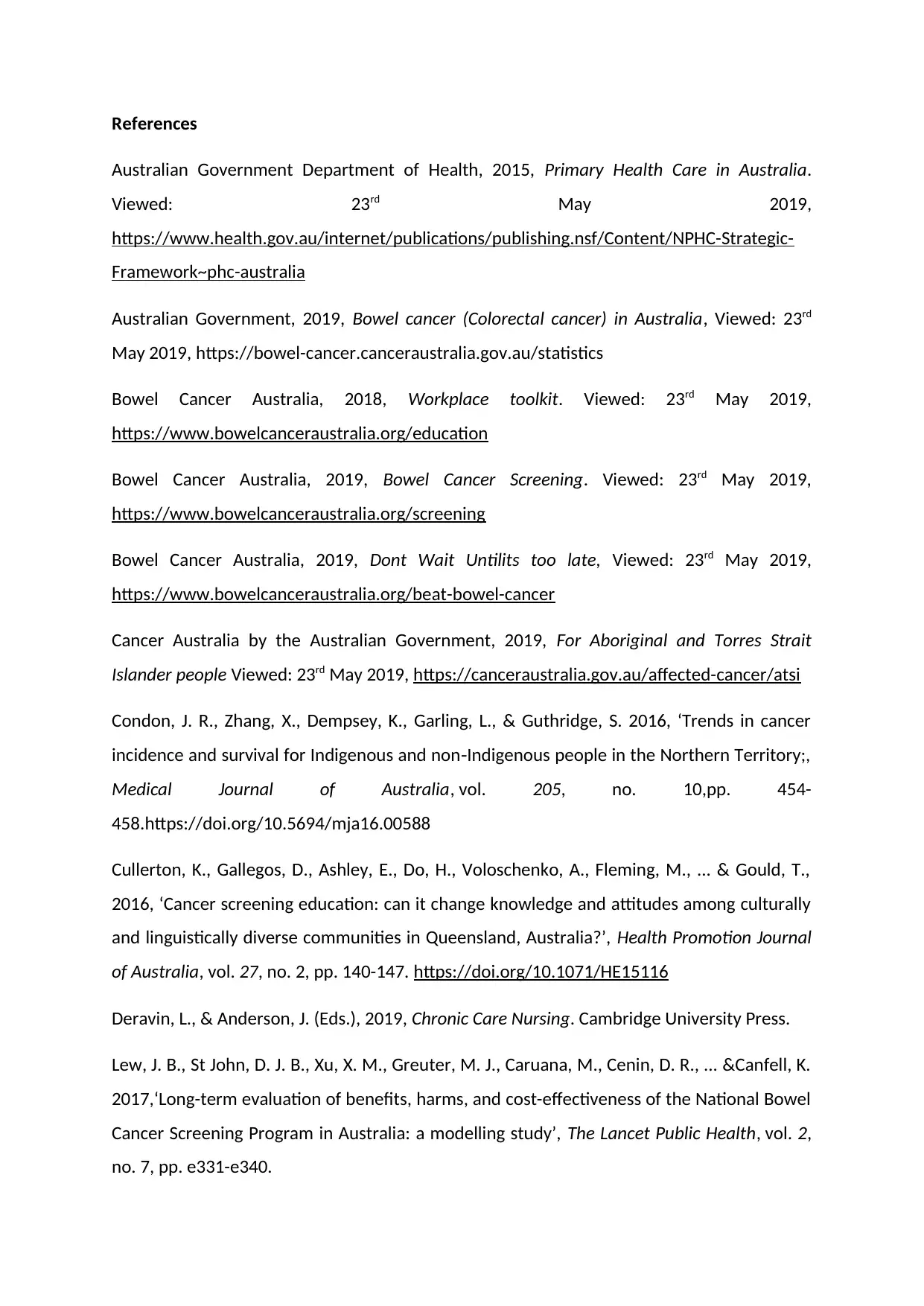
References
Australian Government Department of Health, 2015, Primary Health Care in Australia.
Viewed: 23rd May 2019,
https://www.health.gov.au/internet/publications/publishing.nsf/Content/NPHC-Strategic-
Framework~phc-australia
Australian Government, 2019, Bowel cancer (Colorectal cancer) in Australia, Viewed: 23rd
May 2019, https://bowel-cancer.canceraustralia.gov.au/statistics
Bowel Cancer Australia, 2018, Workplace toolkit. Viewed: 23rd May 2019,
https://www.bowelcanceraustralia.org/education
Bowel Cancer Australia, 2019, Bowel Cancer Screening. Viewed: 23rd May 2019,
https://www.bowelcanceraustralia.org/screening
Bowel Cancer Australia, 2019, Dont Wait Untilits too late, Viewed: 23rd May 2019,
https://www.bowelcanceraustralia.org/beat-bowel-cancer
Cancer Australia by the Australian Government, 2019, For Aboriginal and Torres Strait
Islander people Viewed: 23rd May 2019, https://canceraustralia.gov.au/affected-cancer/atsi
Condon, J. R., Zhang, X., Dempsey, K., Garling, L., & Guthridge, S. 2016, ‘Trends in cancer
incidence and survival for Indigenous and non Indigenous people in the Northern Territory;,‐
Medical Journal of Australia, vol. 205, no. 10,pp. 454-
458.https://doi.org/10.5694/mja16.00588
Cullerton, K., Gallegos, D., Ashley, E., Do, H., Voloschenko, A., Fleming, M., ... & Gould, T.,
2016, ‘Cancer screening education: can it change knowledge and attitudes among culturally
and linguistically diverse communities in Queensland, Australia?’, Health Promotion Journal
of Australia, vol. 27, no. 2, pp. 140-147. https://doi.org/10.1071/HE15116
Deravin, L., & Anderson, J. (Eds.), 2019, Chronic Care Nursing. Cambridge University Press.
Lew, J. B., St John, D. J. B., Xu, X. M., Greuter, M. J., Caruana, M., Cenin, D. R., ... &Canfell, K.
2017,‘Long-term evaluation of benefits, harms, and cost-effectiveness of the National Bowel
Cancer Screening Program in Australia: a modelling study’, The Lancet Public Health, vol. 2,
no. 7, pp. e331-e340.
Australian Government Department of Health, 2015, Primary Health Care in Australia.
Viewed: 23rd May 2019,
https://www.health.gov.au/internet/publications/publishing.nsf/Content/NPHC-Strategic-
Framework~phc-australia
Australian Government, 2019, Bowel cancer (Colorectal cancer) in Australia, Viewed: 23rd
May 2019, https://bowel-cancer.canceraustralia.gov.au/statistics
Bowel Cancer Australia, 2018, Workplace toolkit. Viewed: 23rd May 2019,
https://www.bowelcanceraustralia.org/education
Bowel Cancer Australia, 2019, Bowel Cancer Screening. Viewed: 23rd May 2019,
https://www.bowelcanceraustralia.org/screening
Bowel Cancer Australia, 2019, Dont Wait Untilits too late, Viewed: 23rd May 2019,
https://www.bowelcanceraustralia.org/beat-bowel-cancer
Cancer Australia by the Australian Government, 2019, For Aboriginal and Torres Strait
Islander people Viewed: 23rd May 2019, https://canceraustralia.gov.au/affected-cancer/atsi
Condon, J. R., Zhang, X., Dempsey, K., Garling, L., & Guthridge, S. 2016, ‘Trends in cancer
incidence and survival for Indigenous and non Indigenous people in the Northern Territory;,‐
Medical Journal of Australia, vol. 205, no. 10,pp. 454-
458.https://doi.org/10.5694/mja16.00588
Cullerton, K., Gallegos, D., Ashley, E., Do, H., Voloschenko, A., Fleming, M., ... & Gould, T.,
2016, ‘Cancer screening education: can it change knowledge and attitudes among culturally
and linguistically diverse communities in Queensland, Australia?’, Health Promotion Journal
of Australia, vol. 27, no. 2, pp. 140-147. https://doi.org/10.1071/HE15116
Deravin, L., & Anderson, J. (Eds.), 2019, Chronic Care Nursing. Cambridge University Press.
Lew, J. B., St John, D. J. B., Xu, X. M., Greuter, M. J., Caruana, M., Cenin, D. R., ... &Canfell, K.
2017,‘Long-term evaluation of benefits, harms, and cost-effectiveness of the National Bowel
Cancer Screening Program in Australia: a modelling study’, The Lancet Public Health, vol. 2,
no. 7, pp. e331-e340.
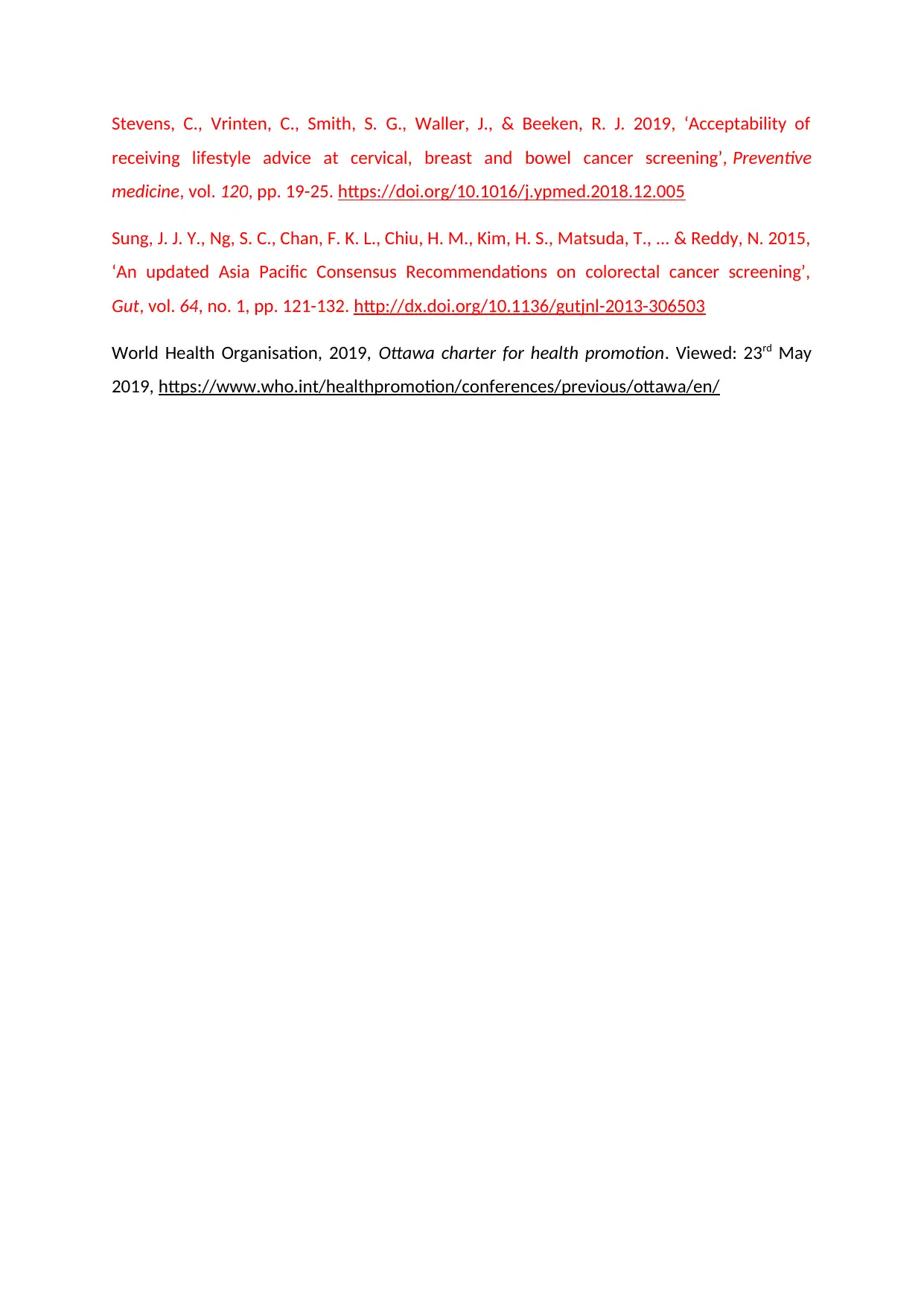
Stevens, C., Vrinten, C., Smith, S. G., Waller, J., & Beeken, R. J. 2019, ‘Acceptability of
receiving lifestyle advice at cervical, breast and bowel cancer screening’, Preventive
medicine, vol. 120, pp. 19-25. https://doi.org/10.1016/j.ypmed.2018.12.005
Sung, J. J. Y., Ng, S. C., Chan, F. K. L., Chiu, H. M., Kim, H. S., Matsuda, T., ... & Reddy, N. 2015,
‘An updated Asia Pacific Consensus Recommendations on colorectal cancer screening’,
Gut, vol. 64, no. 1, pp. 121-132. http://dx.doi.org/10.1136/gutjnl-2013-306503
World Health Organisation, 2019, Ottawa charter for health promotion. Viewed: 23rd May
2019, https://www.who.int/healthpromotion/conferences/previous/ottawa/en/
receiving lifestyle advice at cervical, breast and bowel cancer screening’, Preventive
medicine, vol. 120, pp. 19-25. https://doi.org/10.1016/j.ypmed.2018.12.005
Sung, J. J. Y., Ng, S. C., Chan, F. K. L., Chiu, H. M., Kim, H. S., Matsuda, T., ... & Reddy, N. 2015,
‘An updated Asia Pacific Consensus Recommendations on colorectal cancer screening’,
Gut, vol. 64, no. 1, pp. 121-132. http://dx.doi.org/10.1136/gutjnl-2013-306503
World Health Organisation, 2019, Ottawa charter for health promotion. Viewed: 23rd May
2019, https://www.who.int/healthpromotion/conferences/previous/ottawa/en/
1 out of 9
Related Documents
Your All-in-One AI-Powered Toolkit for Academic Success.
+13062052269
info@desklib.com
Available 24*7 on WhatsApp / Email
![[object Object]](/_next/static/media/star-bottom.7253800d.svg)
Unlock your academic potential
© 2024 | Zucol Services PVT LTD | All rights reserved.





